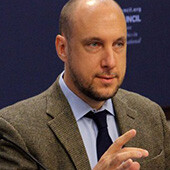Policy Innovations interviews Robin Hodess of Transparency International on her organization's brand new Global Corruption Report 2009, an "authoritative annual report on the state of the fight against corruption."
Robin, what is the state of the global fight against corruption today? Are things improving or getting worse? Were there any surprises?
With 46 country reports and more than 30 expert contributions, this year's Global Corruption Report provides a very comprehensive view of the state of corruption around the world. The balance sheet is mixed: On the plus side, we see rising awareness about corruption risks and the heavy damage it causes. We also find stronger enforcement efforts in some countries. On the downside, the empirical evidence clearly shows that the situation has not markedly improved yet. Bribery is still a significant and by some estimates growing problem, while many other less obvious forms of corruption are looming large—from buying policy influence to using familial relationships to gain contracts—both in the North and the South.
Why is the state of corruption important to policymakers, business leaders, and the public?
The GCR 2009 demonstrates that corruption exacts a heavy burden on societies, business, and individual citizens. When corruption allows reckless companies or employees to disregard laws and flout regulations, the consequences for society are far-flung and often devastating. Corruption contributes to unsafe products, exploitative work conditions, and environmental degradation.
For business, the GCR presents ample evidence that corruption increases the costs of doing business while introducing reputational risks and vulnerability to extortion. It also makes access to capital more expensive, depresses company valuations, and corrodes staff morale.
Most pernicious though is the overall impact of corruption on our communities. Widespread corruption leads to citizens losing trust in public institutions, politicians, and corporations, ultimately undermining the legitimacy and social acceptance on which these actors depend. All this makes the state of corruption a priority issue for policy-makers, business, and the broader public.
Which regions and countries are seeing improvements? Which are deteriorating?
The GCR 2009 highlights that no country or region can claim to be immune to corruption or exhibit consistently superior performance in tackling it. Overall, some of the most troubled and poorest countries in the world continue to be seen as having the gravest problems with corruption. The supply of corruption often comes from wealthier countries, however, so the problem continues to be truly global.
The Report takes a close look at emerging economic power centers such as China, India, and Brazil and finds that they have to be brought much more strongly into the global fight against corruption. Likewise, countries and companies in the North must do much more to fulfill their responsibilities. Legislative loopholes need to be closed. Financial intermediaries, auditors, and other gatekeepers need to have the incentives to prevent corrupt behavior. Companies, too, need to show more ethical leadership and follow through on their promises with credible, verifiable measures to tackle all forms of corruption.
Your report focuses on corruption and the private sector this year. Why?
At this point in history, the private sector plays a pivotal and expanding role in improving the well-being of societies, communities, and individuals. If corporate integrity is compromised and corruption is allowed to flourish, the private sector could fail at all these endeavors.
Transparency International has focused on reform in the private sector since its establishment, working with business to lay out a suite of tools to address and correct bribery and corruption in the business world. We have also done a series of surveys and diagnostics on views of corruption, as it stems from particular countries and sectors. This year, we decided to focus an entire report on the supply side of corruption, and we invited a wide range of scholars, business practitioners, and activists to examine the corruption risks that businesses of all sizes face—as well as the lessons learned in tackling corruption over the past decade. We believe that the report can therefore identify the most-promising strategies for strengthening corporate integrity, which is essential in the current economic crisis.
And what have you learned?
We have learned three central lessons. First, more of the same will not do: Corporate reporting will need to be much more comprehensive, include metrics about the performance of compliance systems, and allow for independent verification in order to be an effective, trusted accountability instrument. Second, regulators need to become much more transparent about the resources they are spending on enforcing regulations and the outcomes they achieve. This is particularly important in the context of the financial crisis that has brought into sharp relief the consequences of regulatory failings. Third, it is not only about corporate efforts on the one hand and law enforcement on the other. Many more actors play important roles in providing additional checks and incentives for corporate integrity. They include investors and owners, civil society and the media, as well as a wide range of gatekeepers and service providers such as auditors, accountants, rating agencies and financial intermediaries. A comprehensive policy initiative for corporate integrity needs to include measures to make these stakeholders more effective.
What role did corruption play in the financial crisis?
Many of the conditions that enabled the financial crisis are related to corruption risks. These include conflicts of interest entangling gatekeepers; misaligned incentives for decision-makers; insufficient transparency and accountability for market segments and market players; and serious lapses in corporate due diligence, governance, and integrity. Recent policy agendas for tackling corruption risks in business are also strongly linked to those intended to prevent a repeat of the financial meltdown. The crisis has focused attention on the failings of regulators and critical problems in international cooperation—issues that the 2009 GCR also identifies as urgent concerns for the effective prevention and punishment of corruption in business.
What are some of your report's innovative ideas to "future-proof" corporate integrity?
The report presents a wealth of innovative tools and promising approaches to strengthen corporate integrity. The right mix depends on business size, sector, and operating context. In Tanzania, SMEs have found a way to counter corruption through collective action by routing requests for fraudulent payments to a single contact point. Major players in the defense industry, for example, have come together to compare notes, discuss corruption challenges, and work toward common standards for anti-corruption due diligence.
The report also presents some very innovative approaches by regulators and law enforcement agencies. Compliance monitors, for example can be placed in companies convicted of corruption to ensure that companies put in place better compliance systems to prevent future wrongdoings. Deferred prosecution agreements are another example that, if used appropriately, can make regulatory resources go much further and sanction wrongdoing more swiftly. These are just a few examples of innovative approaches to strengthening corporate integrity.
Robin Hodess is Director of Policy and Research for Transparency International.





